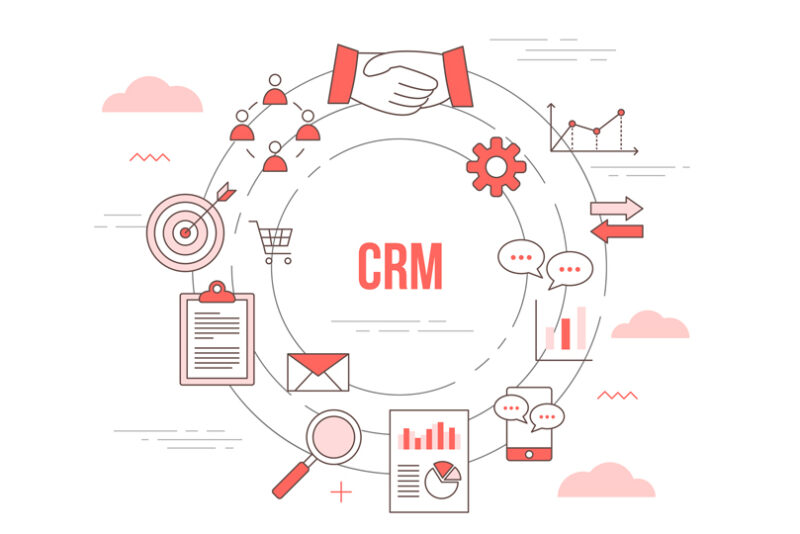Using Outdated Software? 5 Clear Signs It’s Time to Replace Your CRM System
Back in the day, you invested in a CRM system that seemed like the ideal solution to modernise your business processes. But lately, you’ve noticed that it hasn’t kept up with the changes in your business.
It no longer meets your expectations, and instead of boosting productivity, it burdens users with manual administration tasks.
Now you’re left wondering: Has your CRM system become outdated, and is it time to replace it?
In this blog post, we look at 5 tell-tale signs that your business needs a new CRM. Let’s get started.
1) Low user adoption
The first sign that something’s off with your current CRM is when user adoption and engagement falls. Despite having a CRM system, people revert to spreadsheets. Or, they use CRM because they have to, not because they derive any real benefits from it.
There could be several reasons why. Perhaps they find it too complicated to navigate, or they don’t believe it’s actually reducing their admin work and may even be reducing their productivity.
They might see your CRM as another disconnected application. It could also be because the system isn’t properly configured or user-friendly, or your team didn’t receive sufficient training.
All of these factors can contribute to negative sentiment towards CRM, resulting in people not using the system. Establish why user adoption is low. Can this situation be improved with training or system changes, or do you need to invest in new technology?
2) Limited functionality
How well does your CRM meet your needs? The system may have worked well for you in the past, but the software hasn’t kept up with how your business and its processes have evolved.
Perhaps you implemented the CRM quickly, and now gaps have emerged, with people asking for additional functionality that the system currently doesn’t have.
Or you started with an on-premise system, and the new updates have been pouring in on the cloud version, leaving you with a legacy CRM. Or you’ve outgrown it.
Cloud CRM systems, such as Microsoft Dynamics 365, are highly flexible to quickly adapt as you grow. If your current application is not scalable, adding new functionalities may not be cost-effective. This is especially true for a legacy system if you’ll incur bespoke development charges for product changes.
If your CRM is merely a system of record that doesn’t include modern functionality such as automated workflows or offer intelligent insights, then it’s time to make a change.
3) Inaccurate CRM data
Can you use data in your CRM for making informed business decisions? Or has it become so unreliable that no one trusts it?
Poor data quality isn’t just a sign of an outdated CRM; it also reflects bad data management practices. But this is also a sign that your team isn’t fully using the system, as we mentioned earlier.
Relying on repetitive manual data entry to keep a CRM up to date can lead to errors and inaccurate or missing records in the system. Or maybe your CRM software isn’t integrated with your other applications, causing data gaps, duplications and inconsistencies.
All of this can render the reports it generates meaningless. Can you fix data quality issues by enforcing standards and instilling a strong culture of data management?
Or, do you ultimately need a new CRM tool that will automate entry from your emails and surface insights from your data to increase team productivity and reduce manual effort? Whatever the course of action, ensuring clean data in your system must be a high priority.
4) CRM doesn’t integrate with other applications
Your CRM should act as a single source of truth, seamlessly bringing data from different applications into one system. This is possible only when it integrates with your other business tools, such as accounting, marketing automation systems etc.
Does your team waste time and switch between applications to surface the data they need? This shows that data is disconnected. If your CRM is incompatible with your existing systems, it’s time to look for a new one to centralise relationship information.
Also, older CRM tools may have been capable of only handling specific workloads or processes, so it was necessary to have a mix of solutions.
Modern CRMs such as Dynamics 365 have workflows built in for each role in your team, be it sales, customer service, HR or finance. This avoids the necessity of having multiple integrations as your data is stored in the Microsoft cloud.
5) Time-consuming reporting
Another clear sign you’re working with outdated technology is when people repeatedly spend time manually compiling reports. If you are gathering data from various sources, sifting through spreadsheets and distributing reports to stakeholders, then it’s time for an overhaul.
A modern CRM system should make reporting a breeze with real-time dashboards and interactive visualisation to explore your data and extract meaningful insights. These visualisations are accessible to everyone in your team, enabling them to gain immediate insights without tedious data compilation.
How ANS can help
If you encounter one or more of these issues discussed in this post, it’s time to start looking for a new CRM.
Dynamics 365 might be perfect for your business if you’re already using Microsoft apps in your organisation. With its seamless integration, your team can reduce switching between applications by surfacing CRM details within Outlook or Teams or bringing chat into CRM.
As Microsoft continually innovates and extends the capabilities of Dynamics and its cloud platform, you can rest assured that your CRM technology will continue to grow with you.
ANS can help you get started with Dynamics 365 in days, not weeks, with pre-configured features that reduce costs and risks.
However, Microsoft Dynamics 365 is not a magic solution that instantly solves your problems. It still takes a dedicated effort from your team to truly unlock its value. If you already use Dynamics 365, in this post, we’ve gone through in detail some of the things you can do to maximise the value of your CRM investment.
What’s more? With our managed services, our experts are a click away from helping you make a step change in CRM performance. Contact us today to find out how we can help.





